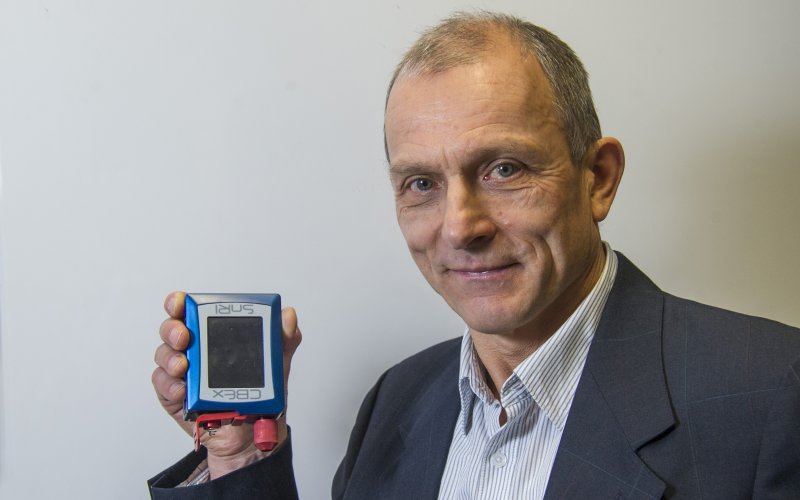UAlbany Start-Up Receives Federal Support to Develop New Technology for Early Diagnosis of Alzheimer’s Disease

By Mike Nolan
ALBANY, N.Y. (Dec. 13, 2022) — University at Albany chemist Igor Lednev has received federal support that will take his start-up company a step closer to developing a new technology that can be used for early diagnosis of Alzheimer’s disease.
Early Alzheimer’s Diagnostics LLC, co-founded by Lednev and his son Alex, was recently awarded a highly competitive National Science Foundation (NSF) Small Business Technology Transfer (STTR) grant. It will be used to advance the commercialization of a screening tool that tests saliva for the detection of early and preclinical Alzheimer’s disease.
The one-year NSF STTR grant of $274,713 will support a Phase I proof-of-concept. The program funds around 400 start-ups each year across the United States.
“Far too many Americans have experienced the devastating impact of Alzheimer’s,” said U.S. Rep. Paul Tonko, in a press release to announce the funding. “Early diagnosis can have a major impact on ensuring access to treatments and vastly improving quality of life for patients and their families. I have long been at the forefront of efforts to increase access to early diagnostics for Alzheimer’s disease, and I’m proud to see this innovative research taking place here in the Capital Region.”
Laser Focused
The Lednev lab, located inside The RNA Institute, has pioneered the use of Raman spectroscopy for forensic and medical diagnostic purposes over the last decade.
Raman spectroscopy is an analytical technique where scattered light is used to obtain the molecular vibrational characteristics of a sample. No two samples will produce the same Raman spectrum, offering a unique measurement that is similar to a fingerprint. Lednev’s novel technology combines this approach with advanced statistics to test body fluid samples — such as saliva.
Lednev’s preliminary research has shown that near-infrared Raman spectroscopy, coupled with machine learning algorithms trained to distinguish spectral differences, can differentiate the biochemical composition of saliva from Alzheimer’s patients and healthy individuals, as well as determine the stage of the disease.
A University spinoff, Early Alzheimer’s Diagnostics LLC targets the commercialization of the patented technology.
“By 2060, nearly one in four Americans will be 65 years or older. The number of 85-plus individuals will triple. With this swelling number of older adults, the country could see greater demands for healthcare, in-home caregiving, and assisted living facilities,” said Lednev, a distinguished professor in the Department of Chemistry. “Our early Alzheimer’s diagnostics technology will be widely accessible, affordable, and minimally invasive, and thus able to reach a large, asymptomatic patient population.
“This technology has the potential to extend early Alzheimer’s care to millions of Americans, allowing interventions, monitoring, and treatment initiation years earlier than what is currently possible.”
Early Alzheimer’s Diagnostics
Following successful preliminary research results, Lednev co-founded Early Alzheimer’s Diagnostics LLC with his son Alex, a Massachusetts Institute of Technology graduate with significant experience in start-up businesses.
Alex serves as the CEO and has been leading efforts to commercialize. He recently took part in the SUNY Startup Summer School, an 11-week training program to help seasoned and prospective innovators and entrepreneurs bring their technologies to market.
“Our research and development have the potential to offer significant broader impacts and benefits to society, due to its potential to advance the health and welfare of the American public,” Lednev said. “We are excited to receive support from NSF, which will allow us to provide proof-of-feasibility of our approach before making it available to the public.”
UAlbany chemistry PhD student Luis Perez-Almodovar will serve as the principal investigator on the NSF grant. Other researchers include Nicole Ralbovsky, a 2020 UAlbany graduate who earned a PhD in chemistry and is now a senior scientist at Merck, and Anqesha Murray, a PhD student at Rensselaer Polytechnic Institute
The company is supported by UAlbany’s Office for Innovation Development & Commercialization and the SUNY Research Foundation.




